Digital Education Market Insights, 2031
The global digital education market size was valued at USD 12.5 billion in 2021, and is projected to reach USD 125.3 billion by 2031, growing at a CAGR of 26% from 2022 to 2031.
Rise in the adoption of advanced technologies in digital education, increase in penetration of smartphones, and internet penetration positively impacts the growth of the market. In addition, surge in use of AI and machine learning in digital education boosts the growth of the market across the globe. However, factors such as lack of social interactions in the digital education and high cost of implementation limit the growth of the market. On the contrary, emergence of several trends, such as micro learning, gamification, adoptive learning, and mobile learning are expected to offer remunerative opportunities for the expansion of the digital education market during the forecast period.

Digital education is the innovative incorporation of modern technology and digital tools to assist the progress of teaching and learning. It is also known as technology-enhanced learning (TEL), digital learning, or e-learning. Digital education is the way forward to seeking education through the means of technology and digital devices.
Digital education provides various benefits to students, which include low cost of education and specialized course learning. In addition, digital education has become an integral part of most organizations as it enhances the performance of employees. For instance, according to IBM statistics, e-learning can increase productivity by 50%, by utilizing online learning software to provide employees with an incredible opportunity to engage in their training courses at any convenient time.
Segment Review
The digital education market is segmented on the basis of learning type, course type, end user, and region. By learning type, it is divided into self-paced online education and instructor-led online education. On the basis of course type, the market is bifurcated into science, technology, engineering, and mathematics (STEM), business management, and others. By end user, it is divided into academic institutions & individuals and enterprises. Region-wise, the market is analyzed across North America, Europe, Asia-Pacific, and LAMEA.
The key players that operate in the digital education market are Alison, Brain4ce Education Solutions Pvt. Ltd., BYJU'S, Coursera Inc., DataCamp, Inc., Edmodo, edX LLC., Intellipaat Software Solutions Pvt. Ltd., iversity learning solutions GmbH, Jigsaw Academy Education Pvt. Ltd., LinkedIn Corporation, MiriadaX, NovoEd, Pluralsight LLC., Udacity, Inc., Udemy, Inc., and XuetangX. These players have adopted various strategies to increase their market penetration and strengthen their position in the industry.

In terms of digital learning type, the self-paced online education segment holds the largest digital education market share as it can be done across different platforms, websites, PCs, and mobile apps. However, the instructor-led online education segment is expected to witness growth at the highest rate during the forecast period due to real time doubt clarification and two-way interactions.

Region-wise, the digital education industry was dominated by North America in 2021 and is expected to retain its position during the forecast period owing to the availability of high-speed internet and the advent of the 5G network. In addition, 5G network enables service providers to improve learning through the incorporation of AR & VR technologies that require high-speed internet connection for effective operation. However, Asia-Pacific is expected to witness significant growth during the forecast period, due to the growing internet penetration and adoption of digital education by various institutes across the region.
COVID-19 Impact Analysis
The COVID-19 impact has prompted every company and the digital education industry to shift their business operations toward a remote work environment. Moreover, due to strict guidelines issued by government authorities, people were forced to stay in-house. This led to the adoption of digital education globally. COVID-19 had a positive impact on the digital education market. Moreover, the COVID-19 pandemic has transformed the working model of the educational sector by focusing more on online working models, which has created a lucrative scope for the digital education market. After the outbreak of the pandemic, countries including the U.S., Italy, China, and other developed countries were among the first to adopt online education courses and teaching methodologies, creating a higher investment scenario within the market for educational technology.
Top Impacting Factors
Technological Advancements in Digital Education
Education is not anymore limited to textbooks and classrooms; it has become an amalgamation of technology, innovative learning, and digital content. As technology progressed, the excitement and appeal of digital education only increased with more visual stimulus, creativity, and satisfaction. Moreover, the emergence of ever-evolving technology has made learning interactive, engaging, motivating, and handy.
For instance, in July 2020, the Central Board of Secondary Education (CBSE) joined hands with Facebook, Inc., a U.S.-based online social media and social networking service company, to launch an augmented reality, digital safety, and online safety prospectus in India. In addition, technological advancements, such as augmented reality, virtual reality, and artificial intelligence have made education more interesting. The evolution of technologies is rapidly increasing the adoption of digital education as it offers unique experience of learning and provides immense satisfaction to the students. These benefits are driving the digital education market growth.
Increase in Demand for Microlearning
Microlearning is an organizational training method that delivers short bursts of on-demand content for learners to study at their convenience. By presenting information in bite-sized chunks, learners can retain information better. In addition, it is less time-consuming, easier, and more cost-effective to produce. Plus, it is widely considered more engaging and interesting than traditional e-learning. All these benefits of microlearning are driving the digital education market growth.
Key Benefits for Stakeholders
This report provides a quantitative analysis of the digital education market forecast, current trends, estimations, and dynamics of the digital education market analysis from 2021 to 2031 to identify the prevailing digital education market opportunities.
The market research is offered along with information related to key drivers, restraints, and opportunities.
Porter's five forces analysis highlights the potency of buyers and suppliers to enable stakeholders make profit-oriented business decisions and strengthen their supplier-buyer network.
In-depth analysis of the digital education market segmentation helps determine the prevailing market opportunities.
Major countries in each region are mapped according to their revenue contribution to the global market.
Market player positioning facilitates benchmarking and provides a clear understanding of the present position of the market players.
The report includes the analysis of the regional as well as global digital education market trends, key players, market segments, application areas, and market growth strategies.
Digital Education Market Report Highlights
| Aspects | Details |
| Market Size By 2031 | USD 125.3 billion |
| Growth Rate | CAGR of 26% |
| Forecast period | 2021 - 2031 |
| Report Pages | 320 |
| By Learning Type |
|
| By Course Type |
|
| By End-user |
|
| By Region |
|
| Key Market Players | Edmodo, Inc., LinkedIn Corporation, eDX, LLC, MiriadaX, DataCamp, Udacity, Inc., Coursera, Inc., byjus, Brain4ce Education Solutions Pvt. Ltd., XuetangX, Alison, Intellipaat Software Solutions Pvt. Ltd., Udemy Inc., Pluralsight LLC, iversity learning solutions GmbH, Jigsaw Academy Education Pvt. Ltd |
Analyst Review
The global digital education market is projected to witness prominent growth, especially in Asia-Pacific and North America. This growth is attributed to increased investments by key players for digital education and adoption of cloud-based education systems. In addition, the adoption of IoT (Internet of Things)-based devices globally and technological advancements such as augmented reality (AR) provide ample growth opportunities for the digital education market. Moreover, with digital learning, learners can access content anywhere and anytime. Furthermore, factors such as increase in need for operational efficiency in education processes and rise in demand for data-driven teaching are expected to fuel the market growth.
In addition, surge in adoption of cloud as well as mobile-based education applications is expected to drive the growth of the market. In addition, digital education has been significantly driven by the government’s focus on strengthening digital infrastructure, including providing internet connectivity in the remote areas. For instance, according to IAMAI-Kantar Cube, active internet users in India is estimated to reach 900 million by 2025, up by 45% over 622 million active internet users in 2020. Also, internet penetration in the country is expected to be up by 55% by 2025.
Furthermore, the digital education market is expected to witness increase in adoption in the coming years, owing to digital transformation in the education sector and rapid adoption of digital learning among various sectors.
The global digital education market was valued at $12,471.45 million in 2021, and is projected to reach $125,328.48 million by 2031
The global digital education market is projected to grow at a compound annual growth rate of 26% from 2022 to 2031 to reach USD 125,328.48 million by 2031
The key players that operate in the digital education market are Alison, Brain4ce Education Solutions Pvt. Ltd., BYJU'S, Coursera Inc., DataCamp, Inc., Edmodo, edX LLC., Intellipaat Software Solutions Pvt. Ltd., iversity learning solutions GmbH, Jigsaw Academy Education Pvt. Ltd., LinkedIn Corporation, MiriadaX, NovoEd, Pluralsight LLC., Udacity, Inc., Udemy, Inc., and XuetangX.
North America is the largest regional market for the digital education market.
The digital education market is driven by technological advancements, increased internet penetration, demand for flexible learning, and growing adoption of online platforms in schools and businesses.
Loading Table Of Content...
Loading Research Methodology...



